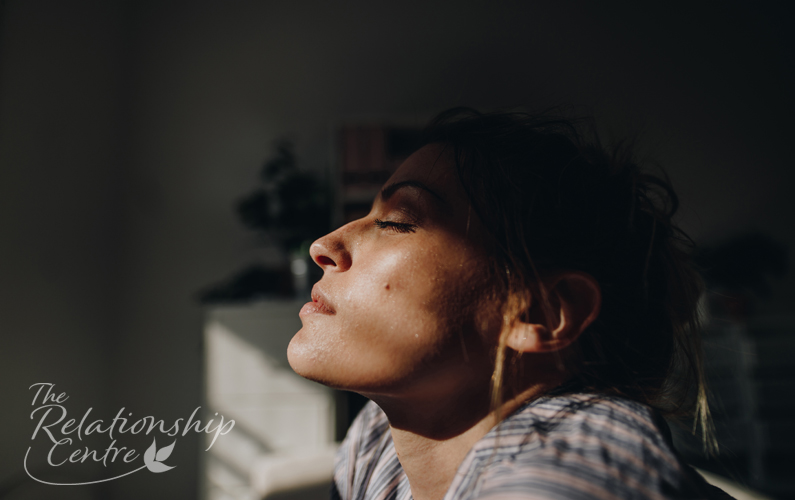Anxiety is common. And since the beginning of the COVID pandemic, more people are experiencing anxiety than ever before.
Anxiety can impact every area of life, and in more moderate and severe cases, it creates significant suffering for those experiencing it.
If you live with the reality of anxiety, you know this suffering is real. As you manage and care for your mental health, developing habits to enhance your wellness and coping are essential.
5 Anxiety-Reducing Habits to Put Into Practice
Talk to a Loved One
Sadly, a stigma still exists around mental health issues causing some people to suffer in silence. Feelings of shame, weakness or inadequacy can result in hiding your experience. Suppression of your feelings tends to amplify them as your anxious thoughts ramp up in speed and intensity.
Research shows that naming your feelings and sharing them with a trusted family member or friend can diminish the power of your anxious thoughts while also giving you the benefits of receiving a soothing response from someone who cares about you.
Give yourself permission to tell a trustworthy loved one that you are experiencing a spike in anxiety. Such disclosure can enhance the quality of your relationship. It also allows your partner to better understand what you are going through and how they can help.
Exercise
Studies show that exercise can reduce symptoms of anxiety. This occurs through several mechanisms of the brain that regulate stress and produce chemical and hormonal responses promoting improved mood and coping.
From a psychological perspective, exercise teaches us to focus on the “here and now.” When we are anxious, we either worry about the future or ruminate on past events. When we exercise nothing else matters but our current step on the treadmill or our next physical movement.
Exercise also creates a “feel-good moment” of doing something good for your health and wellbeing. You experience a feeling of empowerment that comes from taking care of yourself and engaging in healthy behaviours.
To incorporate exercise, the key is simply to start. Set a realistic goal and be consistent. An olympic effort is not required! An easy stroll in the neighbourhood is a fine place to start.
Practice Gratitude
When you are anxious, you tend to lose perspective. It is easy to engage in catastrophic thinking. You may fixate on the worst possible outcome becoming reality even if it has a low probability of happening.
Gratitude reduces anxiety by providing a healthy dose of positivity and perspective. Gratitude does not dismiss that life is challenging or misfortune occurs. However, it provides a productive counterbalance to the worrying thoughts that run in your mind.
Developing a daily practice of gratitude only takes a few moments but it creates the potential to shift your thoughts from the negative “what ifs” characterized by anxiety, to feelings of thankfulness for the blessings in your life.
Journaling
Journaling is a helpful tool to identify and analyze anxiety-provoking thoughts. We often believe that anxiety comes out of the blue without recognizing the role our thoughts play in our experience of anxiety.
Journaling provides an opportunity to slow down your thought process. This is helpful as an anxious mind tends to spin quickly. Writing your thoughts on paper requires you to slow your thought process down enough so you can identify the thought. Once you have completed that step, you can ask yourself these questions to determine if there is any validity to your thoughts:
- Is this true?
- Will worrying solve this problem/issue/worry?
- Is this just an anxious thought?
- What advice would I give a friend in the same situation?
- How likely is it for my worry to become a reality right now?
Questions such as these help you challenge your thoughts and bring you back to the present moment.
Sleep
There is a strong correlation between sleep and anxiety. Spikes in anxiety can interfere with your ability to fall and stay asleep. While at the same time, insomnia can worsen the symptoms of anxiety disorders and prevent recovery. This situation can quickly become a vicious loop that can be hard to get out of.
Developing good sleep hygiene habits is essential to promote good sleep. It is recommended to have a regular sleep and wake time daily, to avoid caffeine, alcohol, or a heavy meal in the evening, and most importantly to step away from all screens 1-2 hours before going to bed. All of these activities can interfere with your brains’ ability to shut down to effectively prepare for sleep.
Final Thoughts
Living with anxiety is not fun. For many, it can feel like a burden, which is an understandable way to feel. However, the challenge is accepting the need to manage the anxiety – as the alternative is that the anxiety will manage you – which we want to help you to avoid.
If you are experiencing anxiety symptoms that are interfering with your daily functioning or your quality of life, please reach out to our office. Our team of therapists have expert skills in helping people reduce their anxiety symptoms and feel happier and more relaxed in their day-to-day life.










